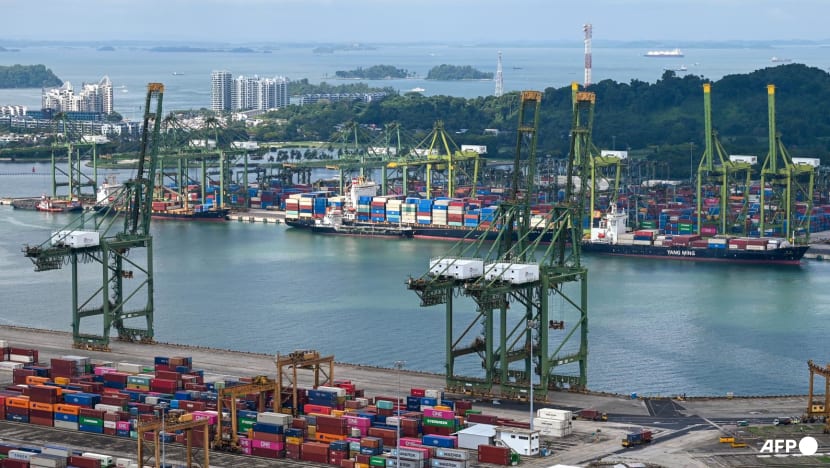Trade deficit with US puts Singapore in a good position, but Trump tariffs could still disrupt trade: Analysts
Singapore is the only Southeast Asian economy to have a trade deficit with the United States, economists said.

A general view shows vessels docked next to stacks of containers at the Pulau Brani port terminal in Singapore on Jul 3, 2024. (File photo: AFP/Roslan Rahman)

This audio is generated by an AI tool.
SINGAPORE: Singapore's trade deficit with the United States may help it avoid being targeted by tariffs, but the country still faces risks from trade tensions, economists said on Friday (Feb 14).
Their comments came after US President Donald Trump signed a memo on "reciprocal tariffs" that would hit both allies and competitors, saying: "Whatever countries charge the United States of America, we will charge them."
Being a small and trade-reliant economy, this "US-led protectionism" could indirectly affect Singapore, said Mr Barnabas Gan, acting group chief economist and head of market research at RHB Bank.
Singapore would likely be affected by second-order negative impacts from tariffs on China, he said.
However, Singapore would probably "see the least of the brunt" because it can take advantage of the free trade agreement it has with the US.
It is also the only economy in the Association of Southeast Asian Nations that runs a trade deficit with the US, he added.
That was also a factor highlighted by HSBC ASEAN economist Yun Liu.
While Singapore may not be directly targeted, she said it looks like 2025 would be characterised by challenges and uncertainties. "Trade turbulence will likely cloud its growth prospects," she added.
Ms Yong Yik Wei, chief economist at the Ministry of Trade and Industry (MTI), was also asked about reciprocal tariffs by the US during a Friday morning briefing on the Economic Survey of Singapore.
She said the impact should not be prejudged as the details have not been worked out.
"The current sense is that there could be a small negative impact on the Singapore economy arising from (the) current suite of tariff measures already implemented or being planned," she said. Ms Yong added that MTI is watching the situation closely and will study the details before making an assessment on the impact on the economy.
TECH CYCLE TO SUPPORT GROWTH
RHB's Mr Gan said the bank maintains its optimistic medium-term outlook on Singapore's manufacturing and services sectors in 2025.
The view is supported by a strong international and local economic landscape and by easing monetary conditions around the world, he said.
The ongoing global technology upcycle is a key trend to watch, he said, and it may not be affected by US-centric policy uncertainties.
Singapore's economic growth in 2024 was driven in part by the electronics cluster of the manufacturing sector, which MTI said grew robustly due to the upturn in the global electronics cycle.
Non-oil domestic exports (NODX), a key exports indicator, grew 0.2 per cent last year, after contracting 13.1 per cent in 2023, Enterprise Singapore said on Friday. The growth was attributed to higher shipments of electronic products.
Mr Gan said the manufacturing sector is expected to continue driving Singapore's economy, supported by strong demand for goods such as electronics.
In particular, RHB is positive on the electronics, precision engineering and transport engineering, which are closely linked to global trade and will benefit from the rising demand for electronics, electrical equipment and heightened trade activity.
"As a major player in the global semiconductor supply chain, Singapore is well-positioned to benefit from a favourable global tech cycle," he said.
RHB sees NODX growing 2 per cent in 2025, within the government's forecast range of between 1 per cent and 3 per cent.
The bank is projecting 3 per cent economic growth for Singapore this year, at the upper end of MTI's forecast of between 1 per cent and 3 per cent.
Ms Liu said HSBC expects more policy support to cushion the impact of lacklustre performance by domestic-oriented services as well as the high cost of living.
"Fiscal support is likely to do the heavy-lifting," she said.


















